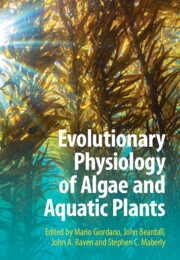Book contents
- Evolutionary Physiology of Algae and Aquatic Plants
- Evolutionary Physiology of Algae and Aquatic Plants
- Copyright page
- Contents
- Contributors
- Preface
- Acknowledgments
- 1 Environmental Changes Impacting on, and Caused by, the Evolution of Photosynthetic Organisms
- Part I Origins and Consequences of Early Photosynthetic Organisms
- Part II Physiology of Photosynthetic Autotrophs in Present-Day Environments
- 7 Light as a Major Driver of Algal Physiology and Evolution
- 8 Temperature: Still an Enigmatic Driver in the Evolution and Physiology of Algae
- 9 Nutrient Acquisition by Algae and Aquatic Embryophytes
- 10 Salinity
- 11 Desiccation
- 12 Trait Trade-Offs in Mixoplankton: An Analysis
- 13 Effects of Pollutants on Microalgae
- 14 Algae in Extreme and Unusual Environments
- Part III The Future
- Index
- References
13 - Effects of Pollutants on Microalgae
from Part II - Physiology of Photosynthetic Autotrophs in Present-Day Environments
Published online by Cambridge University Press: 24 October 2024
- Evolutionary Physiology of Algae and Aquatic Plants
- Evolutionary Physiology of Algae and Aquatic Plants
- Copyright page
- Contents
- Contributors
- Preface
- Acknowledgments
- 1 Environmental Changes Impacting on, and Caused by, the Evolution of Photosynthetic Organisms
- Part I Origins and Consequences of Early Photosynthetic Organisms
- Part II Physiology of Photosynthetic Autotrophs in Present-Day Environments
- 7 Light as a Major Driver of Algal Physiology and Evolution
- 8 Temperature: Still an Enigmatic Driver in the Evolution and Physiology of Algae
- 9 Nutrient Acquisition by Algae and Aquatic Embryophytes
- 10 Salinity
- 11 Desiccation
- 12 Trait Trade-Offs in Mixoplankton: An Analysis
- 13 Effects of Pollutants on Microalgae
- 14 Algae in Extreme and Unusual Environments
- Part III The Future
- Index
- References
Summary
Aquatic phototrophs are increasingly being exposed to a host of potentially toxic materials, mostly anthropogenic in origin, that contaminate oceans and freshwater ecosystems. Here, focusing on algae, we consider the effects of pesticides (herbicides and insecticides), polychlorinated biphenyls, plastics, hydrocarbons and heavy metals on aspects of growth and physiological performance. Algae differ widely in their resistance to these pollutants, but some have been shown to actively remove toxicants from the surrounding water, either by biochemical detoxification processes or by absorption to cell components (in many cases the cell wall). Algae with the ability to remove pollutants from affected water have been proposed as possible agents of bioremediation, though to date most of the studies have been at the laboratory scale and there is a need to show that algal remediation can be achieved at scale. There is also a need for more studies using ecologically relevant concentrations of pollutants and investigation of interactions between multiple pollutants and environmental factors.
Keywords
- Type
- Chapter
- Information
- Evolutionary Physiology of Algae and Aquatic Plants , pp. 252 - 271Publisher: Cambridge University PressPrint publication year: 2024

